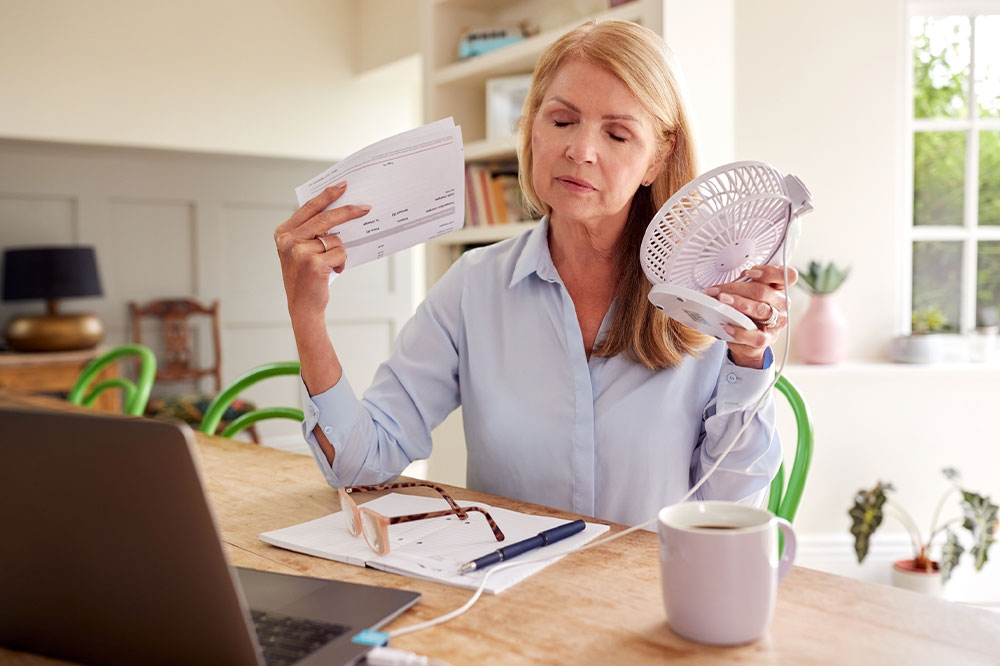Menopause – Symptoms and management tips

Menopause, a natural process, signals the end of a woman’s childbearing years. Significant hormonal changes are underway, which can result in various physical and psychological symptoms. Although controlling these symptoms might be difficult, there are many techniques that women might use to lessen their discomfort. We will offer suggestions and guidance on how to manage menopause symptoms and enhance the general quality of life throughout this transitional period in this article.
Menopause symptoms
Changes in hormone levels, specifically a decrease in the ovarian synthesis of estrogen and progesterone, lead to menopause symptoms. Menopause symptoms can range in severity and duration and might include:
Periods becoming irregular
As menopause approaches, periods may vary, get lighter or heavier, or stop entirely.
Hot flashes
Hot flashes or short bouts of warmth extend to the face and upper body, followed by flushing, perspiration, and chills.
Night sweats
Night sweats can produce excessive perspiration while you sleep, disrupting your sleep cycle.
Vaginal dryness and discomfort
Dryness, itching, burning, and pain in the vaginal area during sexual activity are all signs of low estrogen levels.
Mood swings
Changes in mood, such as impatience, anxiety, depression, and difficulties concentrating, are common throughout menopause.
Symptoms of menopause and tips for managing it
Insomnia
During menopause, many women have trouble falling or staying asleep.
Modifications to sexual function
Menopause may result in decreased libido or sexual desire and difficulties initiating orgasm.
Urinary incontinence
The weakening of the pelvic floor muscles brought on by the decline in estrogen levels can also cause leaking or incontinence of the urine.
It’s crucial to remember that not all women go through menopause with the same symptoms, and some may have more severe symptoms than others.
Tips for managing menopause symptoms
Women can employ several techniques to lessen the effects of menopause. Here are some suggestions:
Hormone therapy
Taking estrogen and progesterone to supplement the hormones the body is no longer producing is known as hormone therapy. Hot flashes, night sweats, vaginal dryness, and mood swings can all be helped by doing this.
Lifestyle changes
Lifestyle adjustments can assist with symptoms like hot flashes and mood swings. These adjustments can include regular exercise, a good diet, and stress-reduction methods like yoga or meditation.
Supplements and alternative treatments
Black cohosh, evening primrose oil, and soy are some supplements that some women use to ease the symptoms of menopause. For some women, acupuncture and other complementary therapies can also relieve symptoms.
Prescription treatment
Some prescription treatments can assist with symptoms like mood swings and hot flashes.
Vaginal lubricants and moisturizers
Using vaginal oils and moisturizers can help relieve vaginal dryness and pain symptoms and increase sexual comfort.
Get adequate rest
Aim for seven to eight hours of sleep each night to combat insomnia and exhaustion.
Remember that every woman goes through menopause uniquely, so what works for one woman might not work for another.
Final words
Every woman eventually goes through menopause, which is a natural process. There are some methods that ladies can employ to lessen their discomfort, although managing the symptoms that go along with it can be difficult. Speaking with a healthcare expert is essential to handle your specific symptoms and enhance your general quality of life during this transitional period. Women can successfully manage their menopause symptoms and live a healthy, satisfying life by taking the correct approach.



